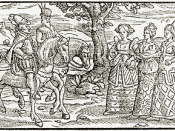In Shakespear's tragedy, Macbeth, the theme defiantly circles the issues of fate and free will. For some, however, which theme leads to Macbeth's demise is unclear. Though the witches claimed to for see his future on the thrown, was it really an act of fate that wound up bringing him there? Or could it be chalked up to an educated guess that coerced Macbeth to take the issue into his own hands??
The witches or "weird sisters" spell Macbeth's fate out for him. They tell him that he is to be king. Soon after Macbeth kills the existing king and claims the throne. This is where the theme of free will comes into play. Is Macbeth's claim to the throne really a matter of fate, or were the words of the witches only what pushed Macbeth into executing a plot that had been stewing in his mind for quite a while.
Throughout the play it becomes increasingly clear that Macbeth has a spirit living within him that will be stopped by nothing and noone. Were the witches just stating the inevitable? That a man with such a demeanor will inevitably one day take the throne?
If this was the witches only prediction one could ponder this topic for days and weeks on end. It is the other predictions of the witches that bring the theme of fate into a brighter light. On Macbeth's second visit to the witches they predict that Macbeth cannot be killed by any man "of woman born," and that he will not be able to be defeated until Birnam wood physically moves toward his stronghold at Dunsinane. These predictions initially seem preposterous almost destroying the witches credibility in the readers mind. That is until Malcom orders that the English and rebel...


